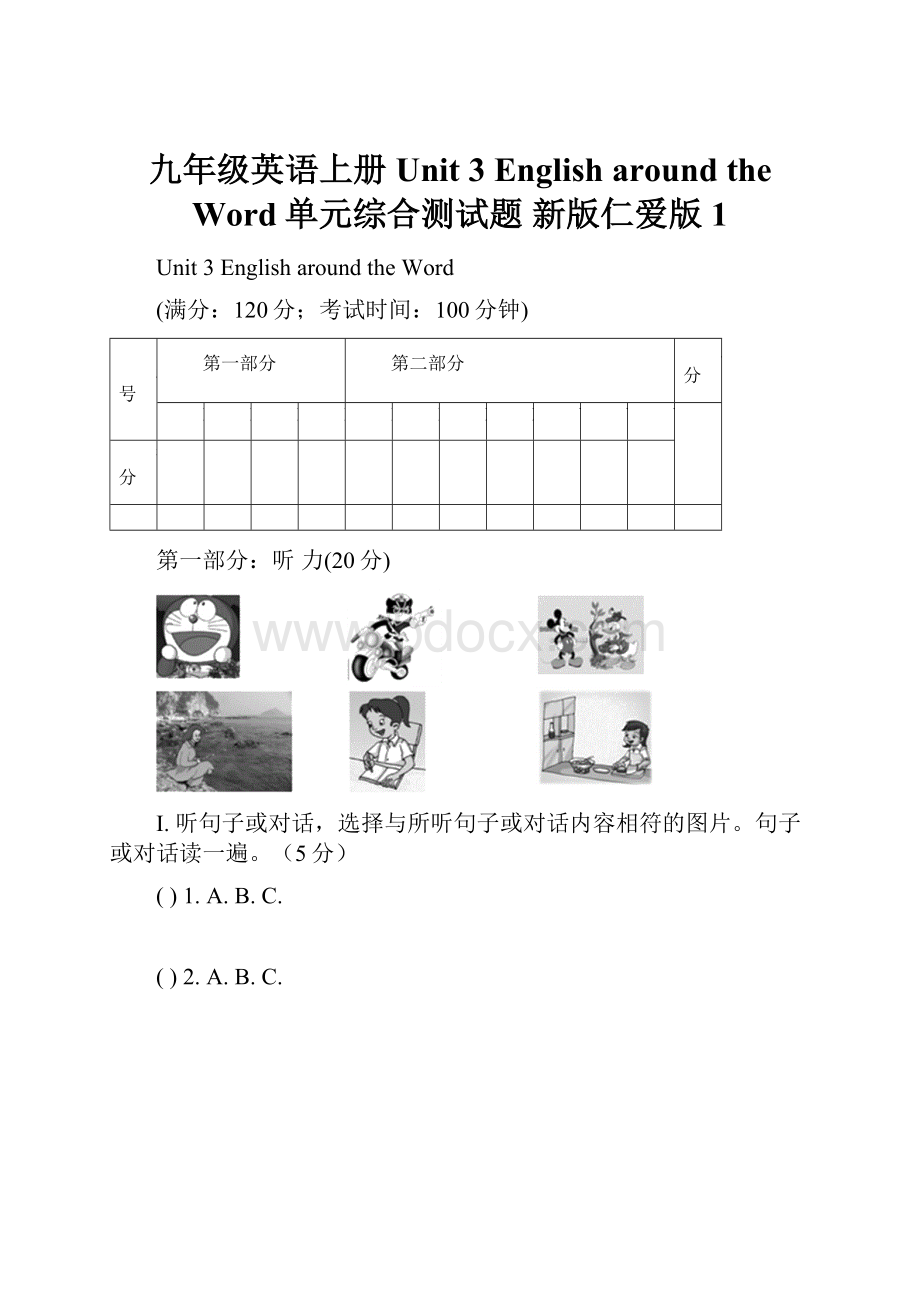 九年级英语上册 Unit 3 English around the Word单元综合测试题 新版仁爱版1.docx
九年级英语上册 Unit 3 English around the Word单元综合测试题 新版仁爱版1.docx
- 文档编号:25750393
- 上传时间:2023-06-12
- 格式:DOCX
- 页数:16
- 大小:114.55KB
九年级英语上册 Unit 3 English around the Word单元综合测试题 新版仁爱版1.docx
《九年级英语上册 Unit 3 English around the Word单元综合测试题 新版仁爱版1.docx》由会员分享,可在线阅读,更多相关《九年级英语上册 Unit 3 English around the Word单元综合测试题 新版仁爱版1.docx(16页珍藏版)》请在冰豆网上搜索。

九年级英语上册Unit3EnglisharoundtheWord单元综合测试题新版仁爱版1
Unit3EnglisharoundtheWord
(满分:
120分;考试时间:
100分钟)
题号
第一部分
第二部分
总分
Ⅰ
Ⅱ
Ⅲ
Ⅳ
Ⅰ
Ⅱ
Ⅲ
Ⅳ
Ⅴ
Ⅵ
Ⅶ
得分
第一部分:
听力(20分)
Ⅰ.听句子或对话,选择与所听句子或对话内容相符的图片。
句子或对话读一遍。
(5分)
()1.A.B.C.
()2.A.B.C.
()3.A.B.C.
()4.A.B.C.
()5.A.B.C.
Ⅱ.听句子,选择与所听句子内容意思最相近的一项。
每个句子读一遍。
(5分)
()6.Itispolitetosay“_____”toyourfriendswheneverandwhereveryoumeet.
A.“g”day.B.Goodmorning.C.Howareyou?
()7.Iamusedtoputtingmysuitcase_____.
A.inthecarB.inthebootC.inthetruck
()8.Iwasgladtohear“_____”thatmyteachersaidtome.
A.Welldone.B.Comeon.C.Youareagoodboy.
()9.You’dbetterhaveawalk_____.
A.inyoursparetimeB.atyourhouseC.onweekends
()10._____Jane’sfatherhastotraveltoacountrywhereEnglishisnotspoken.
A.SomedayB.OnceinawhileC.Attimes
Ⅲ.听对话,判断正(T)误(F)。
每段对话读一遍。
(5分)
()11.Jackstudiesforatestbyworkingwithagroup.
()12.Lindacan’tremembersomeofthewords.
()13.Mikeusedtobethin.
()14.Chineseisn’tspokenbythelargestnumberofpeopleintheworld.
()15.ThestudentscanuseEnglish-Chinesedictionariesinclass.
Ⅳ.听短文,选择正确答案。
短文读两遍。
(5分)
()16.Whydidthespeakergotoalanguageschool?
A.Toasksomestrangequestions.
B.TolearnsomeEnglish.
C.ToseehisfriendsfromAmerica.
()17.Howmanydaysaweekdidthespeakergotothelanguageschool?
A.Sixdays.B.Fivedays.C.Sevendays.
()18.Whatdidthespeakerdoonedayduringthebreak?
A.Askedforsomethingtoeat.
B.ThankedAliceforthehelp.
C.AskedAliceaquestion.
()19.WhatdidthespeakerthinkafterAliceansweredthequestion?
A.Alicewasreallyhelpful.
B.Alicewantedtosellcakes.
C.Americawasreallya“money”country.
()20.WhydidAlicelookatthespeakerwithabigsmile?
A.Thespeakerwasveryfunny.
B.Thespeakermisunderstoodher.
C.Alicewasveryfriendlytothespeaker.
第二部分:
笔试(100分)
Ⅰ.单项选择。
(15分)
()1.Englishispopulararoundtheworldandmostpeoplespeakit_____asecondlanguage.
A.asB.likeC.forD.by
()2.—IsSpanishsimilar_____Italian?
—Notreally.
A.toB.withC.forD.on
()3.—_____areyoushoutingataloud?
—Tom.Hehasn’tboughtmeatubeof_____.
A.What;toothpasteB.Whom;toothpaste
C.How;toothpasteD.Where;toothpaste
()4.WangFan,couldyougiveus_____onhowtolearnEnglish_____?
A.someadvices;goodB.someadvice;good
C.anyadvices;wellD.someadvice;well
()5._____youdo,Iwillbeonyourside.
A.WheneverB.WhateverC.HoweverD.Wherever
()6.Everyoneknowsthatadeskismade_____woodandpaperismade_____wood,too.
A.of;ofB.from;ofC.from;fromD.of;from
()7.TherearemanydifferencesbetweenAmericanEnglishandBritishEnglishinspellingandpronunciation,especiallyin_____English.
A.writtenB.oralC.officialD.business
()8.Oh,themilk_____strange,doyouthinkit’sOKtodrink?
A.wastastedB.tastedC.istastingD.tastes
()9.Yesterdayevening,Iwenttothetrainstationtoseemybestfriend_____.
A.offB.upC.throughD.out
()10.Weshouldhave_____inourselves.Wewillmakeitifwetryourbest.
A.successB.confidenceC.progressD.knowledge
()11.Youcangoouttoplayfootballafter_____yourhomework.
A.finishB.finishingC.finishesD.finished
()12.BecauseI’mafraidofMr.Wolfintheclass,I_____notansweranyquestion.
A.can’tB.dareC.couldD.will
()13.MyEnglishispoor,but_____studentslaugh_____me.
A.alittle;atB.afew;atC.few;atD.little;in
()14.IthoughtMr.Li_____notcometohelpmewithmyEnglishtoday.
A.canB.mayC.mightD.must
()15.Theyagreedwithhim,butitdidn’tmeanto_____him.
A.believeinB.believeC.believinginD.believes
Ⅱ.情景交际。
(5分)
从方框中选出适当的句子补全对话,其中有两项是多余的。
A:
What’swrong,Jim?
Youlookunhappy.
B:
I’mnot.IfeelalittleworriedaboutmyEnglish.
A:
16
B:
I’mnotgettingalongwellwithit.
A:
17
B:
Well,IseldomhavechancestomeetEnglishpeople.
A:
18
B:
WhereshouldIgo?
A:
19
B:
But...itseemsEnglishpeopleneverspeaktome.
A:
Ah!
Youshouldspeakfirst.
B:
20
A:
Theweather!
Englishpeoplearealwaysinterestedinweather.
A.YoushouldgotoanEnglishcorner.
B.WhatcanItalkabout?
C.YoushouldlearnEnglishwell.
D.What’stheproblem?
E.Whyso?
F.WhatcanIdoforyou?
G.Youshouldgooutmore.
Ⅲ.完形填空。
(10分)
TheEnglishlanguageisdifferentfromanyotherlanguage.YetEnglishwordsdonot
21thesame.Itisalways22.Peopleneednewwords23newinventionsandnewideas.Differentwordscomeintouseorolderwordsareusedinanewway.
Englishcanchangebyborrowingwordsfromotherlanguages.Theword“tomato”wasborrowedfromMexico,theword“coffee”camefromTurkey,and“tea”from24andsoon.Nownewspaceandsciencewords25fromothercountries,too.Newwordsarealsomadebyaddingtwowords26.Thewords“strawberry”,“postman”and“blackboard”aremadeupoftwoparts.
Sometimesnewwordsare27formsofoldwords.Theword“photo”wasmadefrom“photograph”bycuttingoffthe28ofthelongword.Theword“plane”wasmadebycuttingoffthe29partof“airplane”.While“smog”wasmadebyusingonlythefirsttwolettersof“smoke”andcuttingoffthefrontpartof“fog”.Andproductscanbecomenewwords.Our“sandwich”wasnamedafter30namedSandwich,and“jelly(果冻)”wasanamemadeupbythecompanythatfirstmadethisproduct.
()21.A.leaveB.changeC.stayD.use
()22.A.keepingB.changingC.keptD.changed
()23.A.forB.ofC.withD.about
()24.A.IndiaB.AmericaC.GermanyD.China
()25.A.areborrowingB.arebeingborrowedC.borrowD.buying
()26.A.aloneB.outC.togetherD.outside
()27.A.longerB.middleC.neverD.short
()28.A.beginningB.endC.middleD.front
()29.A.backB.middleC.frontD.end
()30.A.amanB.akindoffoodC.acompanyD.aplace
Ⅳ.阅读理解。
(40分)
(A)
Somepeoplehaveverygoodmemories,andcaneasilylearnquitelongpoemsbyheart,whiletherearepeoplewhocanonlyrememberthingswhentheyhavesaidthemoverandover.
CharlesDickens,thefamousEnglishauthor,saidthathecouldwalkdownanylongstreetinLondonandthentellyouthenameofeveryshophehadpassed.Manygreatmenintheworldhavehadwonderfulmemories.
Agoodmemoryisgreathelpinlearningalanguage.Everybodylearnshisownlanguagebyrememberingwhathehearswhenheisasmallchild.Somechildren—likeboysandgirlswholiveinforeigncountrieswiththeirparents—seemtolearntwolanguagesalmostaseasilyasone.Inschoolsitisnoteasytolearnasecondlanguagebecausethepupilshavesolittletimetopracticeit,andtheyarebusywithothersubjectsaswell.
Thehumanmindisratherlikeacamera,butittakesphotographsnotonlyofwhatweseebutofwhatwefeel,hear,smellandtaste.
Memoryisthediarythatweallcarryaboutwithus.
根据短文内容,判断正(T)误(F)。
()31.Allthehumanshavegoodmemories.
()32.CharlesDickens,thefamousAmericanwriter,couldrememberthingswell.
()33.Agoodmemoryisofimportanceinyourlearningalanguage.
()34.Sometimeswecanlearnasecondlanguagewithoutgoingtoschool.
()35.Thehumanmindisagoodcamera.
(B)
StudentsoftenwanttopracticetheirEnglishoutsideclass.OneofthebestwaystopracticeyourEnglishistospeaktoaforeigner.Thisweek’squestioncomesfromastudentwhoiseagertostartaconversationwiththeforeignersheseeseveryday.Onestudentasks,“IsitOkaytotrytotalktoforeignersIseeinthestreet?
”
Theanswerisyesorno,butprobablyno!
Ifyouseeaforeignerwholookslost,itispolitetoaskhim,“MayIhelpyou?
”But,otherwise,youshouldprobablyletthemgetonwiththeirbusiness.Situations,however,doexist(存在)whereitisquiteallrighttotalktoforeigners.Ifaforeignerentersyourschool,office,shoporrestaurant,forinstance(例如),feelfreetoaskhim(forexample):
—Whatisyourname?
—Wheredoyoucomefrom?
—WhatdoyouthinkofBeijing?
—HowlongwillyoustayinBeijing?
Therearealsosituationswhereit’sOkaytotalktoforeignersinpublicplaces.Ifyouseeaforeigneraloneinarestaurant,barorcoffeeshop,itmaybeappropriate(合适的)toaskhimorher:
—Isthisseatfree?
—DoyoumindifItalktoyouinEnglish?
YoucanprobablyhelpthemiftheyarenewtoChinaandiftheyarealone.Youmaybeabletomakethemfeelmorewelcome.
Afterafewsuchquestions,youshouldknowwhetherthispersonwantstotalktoyouornot.Iftheyaskyousimilarquestions,oriftheygivelong,informativeanswers,you’reinluck.Ifnot,thengivethemtheirprivacy(独处).Talkingtostrangersisfunifyouchoosetherighttimeandplace.
()36.ItisthebestwaytopracticeyourspokenEnglishwith_____.
A.JapaneseB.Americans
C.yourclassmatesD.Frenchpeople
()37.Fromthesecondparagraph,wecangettoknowthat_____.
A.itispolitetostopaforeignertotalkwithhiminthestreet
B.itispolitetointerruptforeignersinaconversation
C.itisimpolitetointerruptaforeignerwhenheorsheisonbusiness
D.itisimpolitetohelpaforeignerfindhisway
()38.Whenyoufirstmeetaforeigner,youshouldsay“_____”
A.Whereareyougoing?
B.Haveyoueatenyourdinner?
C.CanyouhelpmewithmyEnglish?
D.Nicetomeetyou.
()39.Thewritersuggestsusthatweshould_____.
A.followtheforeignerswhenwemeettheminthestreet
B.talkwithfore
- 配套讲稿:
如PPT文件的首页显示word图标,表示该PPT已包含配套word讲稿。双击word图标可打开word文档。
- 特殊限制:
部分文档作品中含有的国旗、国徽等图片,仅作为作品整体效果示例展示,禁止商用。设计者仅对作品中独创性部分享有著作权。
- 关 键 词:
- 九年级英语上册 Unit English around the Word单元综合测试题 新版仁爱版1 九年级 英语 上册 Word 单元 综合测试 新版 仁爱
 冰豆网所有资源均是用户自行上传分享,仅供网友学习交流,未经上传用户书面授权,请勿作他用。
冰豆网所有资源均是用户自行上传分享,仅供网友学习交流,未经上传用户书面授权,请勿作他用。
链接地址:https://www.bdocx.com/doc/25750393.html


 《 岁婴幼儿教养方案》.docx
《 岁婴幼儿教养方案》.docx
